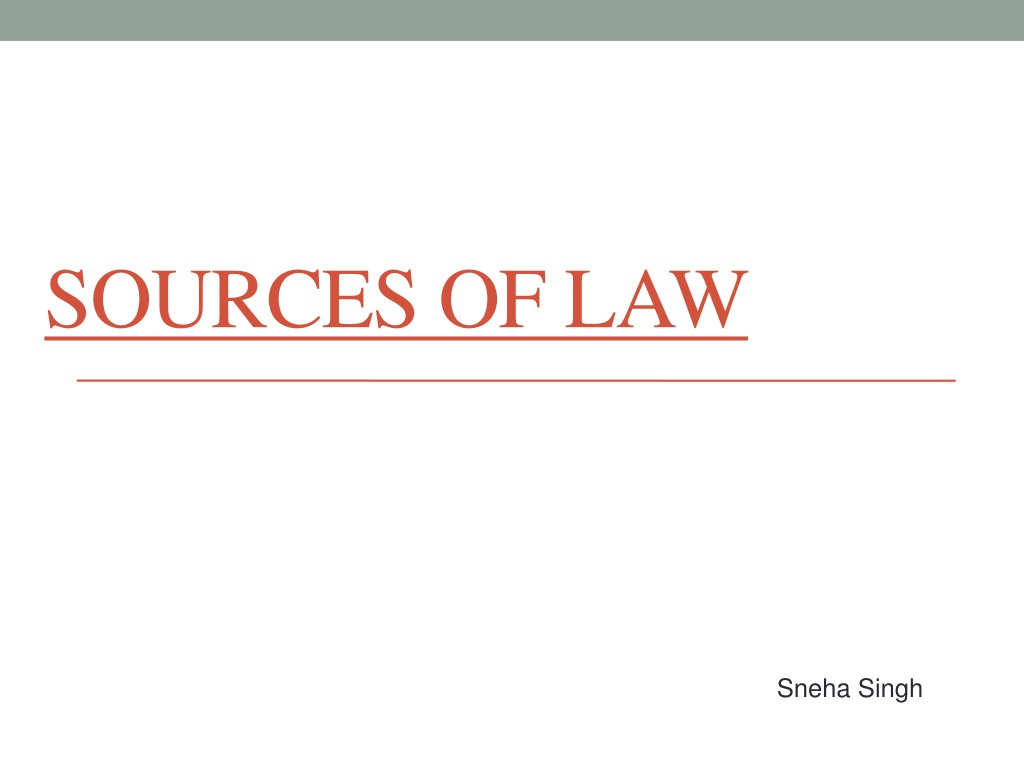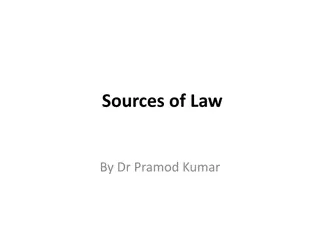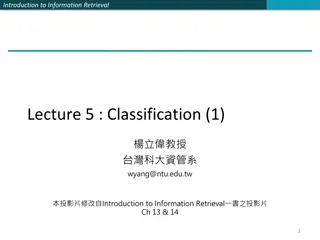Understanding the Sources of Law: Definitions and Classification
The term "sources of law" refers to the origins from which rules of human conduct derive their legal force and binding character. This concept varies among writers and includes factors like Hindu scriptures, sovereign authority, historical documents, customs, and more. This article explores different definitions and classifications of sources of law based on various perspectives, from positivists to historical and sociological jurists, shedding light on formal and material sources of law.
Download Presentation

Please find below an Image/Link to download the presentation.
The content on the website is provided AS IS for your information and personal use only. It may not be sold, licensed, or shared on other websites without obtaining consent from the author. Download presentation by click this link. If you encounter any issues during the download, it is possible that the publisher has removed the file from their server.
E N D
Presentation Transcript
SOURCES OF LAW Sneha Singh
MEANING: The meaning of the term sources of law differs from writer to writer and changes as per context. Generally, Sources of law means the origin from which rules of human conduct come into existence and derive legal force or binding characters. It also refers to the sovereign or the state from which the law derives its force or validity. Alternatively, several factors of law have contributed to the development of law. These factors are also regarded as the sources of law. While there are others who include the material like statute books, treatises, case laws, reports, etc. in the term source of law.
DEFINITION: In Indian Context: It is used in two senses: First- According to Hindu Scriptures, duty is the foundation head of all law. Second- the expression sources of law means where one must resort to get at law, i.e. the Hindu Scriptures (Vedas, Smiritis, Shrutis, Upanishads), evidence of records of land or books or reports. Natural Law philosophers law has divine origin; it is a gift of God contained in Holy Books
DEFINITION: The positivists use the term to denote the sovereign or the State who makes and enforces the laws. Austin said that the term source of law has three different meanings: 1. This term refers to immediate or direct author of the law or the authority from which the law emanates which means the sovereign. 2. This term refers to the historical material/document from which the body of law is gained can be known like Code of Manu. 3. This term refers to the causes that have brought into existence the rules that later on acquire the force of law. E.g. customs, legislations, judicial decision, equity etc.
DEFINITION: The historical jurists (Von Savigny, Henrye Maine, Puchta etc). This group of scholars believed that law is not made but is formed. According to them, the foundation of law lies in the common consciousness of the people that manifests itself in the practices, usages and customs followed by the people. Therefore, for them, customs and usages are the sources of law. Sociological Jurists- This group of scholars protest against the orthodox conception of law according to which, law emanates from a single authority in the state. They believe that law is taken from many sources and not just one. Ehlrich said that at any given point of time, the centre of gravity of legal development lies not in legislation, not in science nor in judicial decisions but in the society itself.
CLASSIFICATION OF SOURCES OF LAW: I. Salmond on Sources of Law- Salmond has done his own classification of sources of law: 1. Formal Sources- A Formal Source is as that from which rule of law derives its force and validity. The formal source of law is the will of the state as manifested in statutes or decisions of the court and the authority of law proceeds from that. 2. Material Sources- Material Sources are those from which the matter is derived though not the validity of law. Material sources are further divided into two heads: i. Historical Sources ii. Legal Sources
Historical Sources- Historical Sources are rules that are subsequently turned into legal principles. Usually, the courts do not allow such principles as a matter of right. They operate indirectly and in a mediatory manner, so they are present but not legally recognised until they are expressly adopted. These are Un-authoritative and some of the examples are Writings of eminent jurists, foreign judgments, conventions, etc. Legal Sources- Legal Sources are instruments or organs of the state by which legal rules are created for e.g. legislation and custom. They are authoritative in nature and are followed by the courts. They are the gates through which new principles find admittance into the realm of law. Some of the Legal Sources are: a. Legislations (Enacted Law) b. Precedent (Case Law) c. Customary Law (based on Customs) d. Conventional Law- based on agreements, Treatises etc. i. ii.
Legislations Formal Sources of Law (Salmond) Precedents Material Customs Conventional Law
CLASSIFICATION OF SOURCES OF LAW: II. Keeton s view- According to Keeton sources of law can be classified into two broad categories which are further of various kinds: 1. Binding Sources- Legislation, Judicial Precedent (Case and Customary Law 2. Persuasive Sources- Principles of Equity, Professional Opinions, Writing of Jurists etc. III. Hindu Jurisprudence- Prior to codification of Hindu law in 1955-56, Dharamshastras, Commentaries and Digests and Custom were the only sources of Hindu Law, but after codification enacted statutes and precedents have assumed importance as source of law.
CLASSIFICATION OF SOURCES OF LAW: IV. Legal Sources of English Law- So far as English Law id concerned the following have been recognised as sources of law: i. Legislation: Supreme and Subordinate ii. Case Law or judicial precedent iii.Custom iv.Conventions based on Agreements
INTER-RELATION B/W SOURCES OF LAW AND SOURCES OF RIGHT: It is significant to note that a source of law may also serve as a source of right. Rather what is seen is that sources of law are primarily legally constitutive of right. An Act of Parliament is a typical source of law and there are several Acts which also serve as sources of rights, for example, Consumer Protection Act, Minimum Wages Act, Protection of Human Rights Act, etc. However, all sources of law are not necessarily sources of right. For example a judicial decision by higher judicial authority is a source of law as regards the world at large but it is only a source of right as regards the successful party and alternatively in case of decision of a Lower court the decision is only a source of right but not a source of law.























